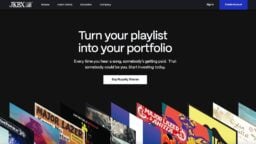
“YouTube? They’re the devil. If someone doesn’t do something about YouTube, we’re screwed. It’s over. Turn off the lights.”
Mega-manager Peter Mensch didn’t mince his words when taking about YouTube this week, so much as delivering them roasting, sizzling and spitting into Google‘s eye.
We’ve heard plenty of YouTube bashing from the music biz these past few weeks, but the Metallica warden’s Satanic analogy is by far the bluntest – and most barbed – to emerge amid a backdrop of simmering fury.
YouTube boss Robert Kyncl didn’t flinch.
In the same two-part BBC Radio 4 documentary, Kyncl apparently deflects attention towards the suspect honesty of major rights-holders – like Universal, with whom his business just happens to be stuck in heated negotiations.
“The artists who are signed up directly with YouTube are seeing great returns,” he comments in next week’s episode, according to the BBC. “If you’re generating a lot of viewership, you’re making a lot of money.”
Kyncl’s theory: acts like hip-hop violinist Lindsey Stirling, who reportedly made $6m from YouTube last year, are the future.
Attacking the music biz’s biggest players, Kyncl then warns artists: “There are middle-men – whether it’s collection societies, publishers or labels – and what they do is they give advances and they want those recouped.
“So it’s really hard when there’s no transparency for the artist… If you don’t have full visibility, you’re somehow more susceptible to negative thinking.”

Kyncl’s language here is worth repeat examination, as its political message will have been carefully crafted:
- Artists ‘signed up’ directly to YouTube – rather than signed to record labels – are making hay;
- Greedy ‘middle-men’ are snaffling revenue from acts who are locked into the money-guzzling trad music business. That’s why their cheques from YouTube are so small;
- Poor ‘susceptible’ sheep – presumably, people like Peter Mensch and Metallica – are being duped, and simply believing the wrong storyteller.
Wow.
A word of advice for YouTube and Kyncl: successful artists with any longevity in their career already know the music business can be bent as hell.
That’s why they surround themselves with people they can trust.
Often, like Peter Mensch, these are individuals whose commitment to their acts and smart advice has been proven beyond reproach by decades of experience.
In short, they’re much more believable than you’ll ever be.
When trusted titans like Mensch are telling artists that it’s Lucifer – rather than Lucian – who’s killing their annual income, you should consider your subsequent public strategy extremely carefully.

More on that in a second. First, let’s bust one of Kyncl’s more easily-lanced myths.
Holding up artists like Lindsey Stirling as an example of what music industry-signed talent could be earning on YouTube is badly flawed.
Why do you think no significant record label A&R signed Stirling as a recording act in the first place?
It’s this: she made her name when millions, sat at home in front of America’s Got Talent, started telling friends: ‘Have you seen this girl? She’s incredible.’
Not: ‘Have you heard this girl? She’s incredible.’
Stirling is an undeniable talent, with a brilliantly executed gimmick. But she’s a TV variety extrovert gone viral.
Her case study doesn’t really apply to the next Drake – let alone the next Nick Drake.

Now, back to the YouTube-artist relationship, and why Kyncl and his team’s decision to start throwing punches about artist cheques could yet prove foolhardy.
Google’s public skirmish with the record business is increasingly making headlines.
Right now, though, the debate is a dusty one.
Corporate Universal is upset with corporate YouTube. The earnest-looking man who used to run Estonia’s economy seems to agree with them.
People keep mentioning DMCA, which sounds like a drug invented by Chris Morris, and they don’t even have the good manners to liven it up with any kind of Village People motif.
It’s a boring, business-y argument and it’s easy prey for Robert Kyncl – with his charming ‘give the money to the artists’ shtick, and ‘free-for-all’ fantasies of ad dollar billions.
Yet the IFPI‘s recent figures, showing the disparity between YouTube and Spotify’s payouts in 2015, would have made shocking reading for the people, like Mensch, whose job it is to translate such data into artist speak.
And last month, the worm began to turn.
When Katy Perry, Deadmau5, Christina Aguilera and Pete Townshend stridently and publicly condemned YouTube’s music payouts (and its DMCA protection), Robert Kyncl’s arguments immediately lost power.
The most important veneer of any tech boss raking it in from cheap music must always be that they understand artists, man. (Ask Tim ‘nice guy V-neck’ Westergren.)
Intimating that ‘susceptible’ performers aren’t clever enough to comprehend who’s lying about their income isn’t going to win you many friends.
Especially when it’s you they’re pissed off with in the first place.

A Justice League of blockbuster artists publicly chastising a tech giant for their lost earnings: it’s been a long, long time coming.
Peter Mensch knows better than anyone what happens when you determinedly refuse to make a deal with the devil.
In 2000, at the US District Court in Northern California, Metallica began its lawsuit against Napster – seeking a minimum of $10m in damages.
The story was continually spun by tech lobbyists at the time as the band ‘suing their own fans’.
To this day, that’s the presiding precis of the case.
The supposed antagonist in this warped narrative was Napster’s most vocal critic within the band, Lars Ulrich.
Yet take a look at this: a typical statement Ulrich made during a TV interview about Napster at the time.
“There are millions of dollars involved in [technology companies] just as there’s millions of dollars involved in the evils of the music business. And if the record company bosses don’t take the money then the internet people are going to take the money…
“I can guarantee you, there is nobody at Napster that is doing this as a charitable event for all of mankind.”
Sound familiar?

With Peter Mensch’s help, Ulrich and Metallica’s popularity recovered.
However, their PR penalty acted as a historic warning for any artist who dared speak out about the devaluation of their art by profiteering web businesses.
For more than a decade, a cloak of fear over talk of personal income silenced music’s blockbuster artistic community.
And then, there was Taylor.
In late 2014, Taylor Swift – rightly or wrongly – pulled her entire catalogue from Spotify.
Unlike Ulrich, whose cogent arguments were painted as grasping by his lawsuit’s explicit talk of finances, Swift directly addressed her fanbase on the theoretical issue of music’s value.
Then, she did it again: censuring Apple Music last summer for its initial refusal to pay artists royalties from the platform’s free trial.
The day after Swift’s open letter, Apple crumbled: SVP Eddy Cue apologized to artists and announced that Apple Music would now stick cash into performer’s pockets even when listeners weren’t paying to hear their tracks.
Plenty of conspiracy theories postulate that it was a pre-arranged stunt.
It doesn’t matter: whether by instinctual protest or organized design, one superstar – helped by the propulsion of the (independent) music business – toppled a technology giant.
Taylor Swift has since told Vogue that her Apple remonstration was the ‘bravest’ and ‘most spontaneous’ moment of her career.
YouTube mustn’t be so arrogant as to think it can’t happen again.

There is, however, a little bit of added complication this time around.
Since MBW reported that YouTube was ploughing tens of millions of dollars into a new vehicle to help artists, we’ve been doing some more digging.
As we speculated, the Google video service has indeed been offering emerging artists use of its facilities – notably via its new Foundry initiative.
But there’s more on the way. Much more.
YouTube knows that its billion-plus monthly audience represents a giant promotional opportunity for artists on the verge of breaking into the big time.
We’ve heard that Kyncl and his team are currently targeting managers and independent labels to show what YouTube could do for a handful of acts it may be keen to help.
The commitment, primarily, will be a promotional one: sustained site-wide artist marketing is an obvious first step, and definitely on the table.
In the midst of its cold war with Universal, wouldn’t it be a disruptive move by YouTube to offer these benefits to independent artists/labels distributed by UMG.
In particular… Big Machine.
The Scott Borchetta label has already shown its willingness to strike direct deals without UMG’s say-so, having inked an agreement with Apple Music for Swift’s exclusive 1989 World Tour video at Christmas.
What was it Peter Mensch said again?
“If someone doesn’t do something about YouTube, we’re screwed.”
Could Taylor Swift soon stand aside Katy Perry and Deadmau5 in the picket line protesting YouTube’s payouts?
Or will her work be plastered all over the very platform causing uproar amongst her peers?
Somewhere in Nashville, the fate of YouTube’s public reputation may rest on a very big decision: one balanced between personal ambition, and an artist revolt crying out for a leader.






